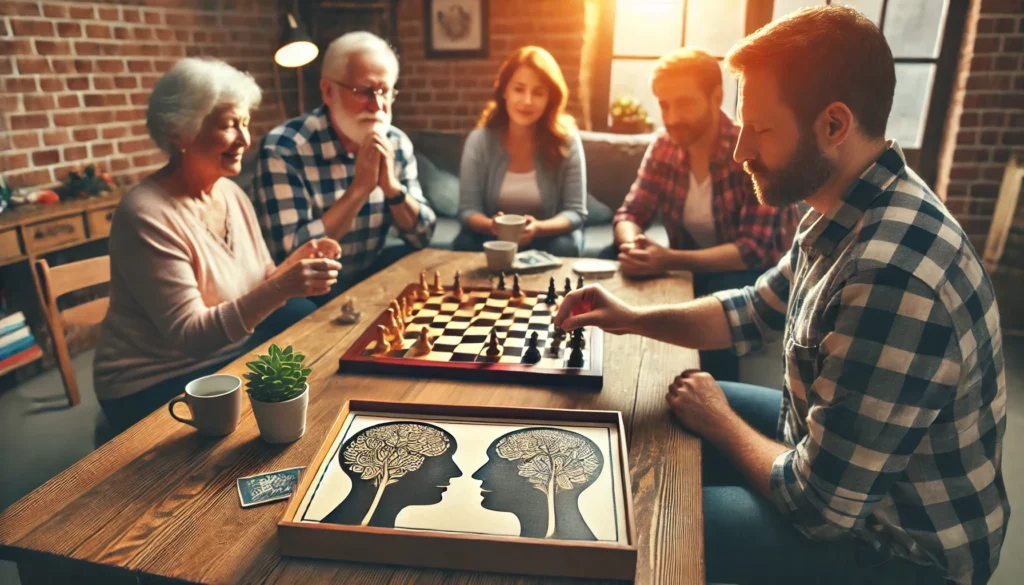Introduction: The Role of Brain Training Programs in Cognitive Enhancement
Cognitive function is essential for learning, problem-solving, and everyday decision-making. As individuals age or face increased cognitive demands, the need for targeted mental exercises becomes more critical. Engaging in structured brain training programs has gained popularity as a means to boost cognitive performance, enhance memory, and strengthen mental agility.
Brain training programs are designed to challenge the brain through a variety of structured exercises aimed at enhancing different aspects of cognitive function, such as memory, attention, processing speed, and problem-solving. Research suggests that brain games to improve memory can enhance neuroplasticity—the brain’s ability to form and reorganize neural connections. When combined with a balanced lifestyle, such programs can help individuals maintain mental sharpness and prevent age-related cognitive decline.
This article explores the effectiveness of brain training programs, highlights the best brain games to increase memory, and provides insights into how brain function games can optimize overall mental performance. By understanding the science behind these programs and incorporating them into daily routines, individuals can unlock their cognitive potential and enhance mental clarity.
You May Also Like: Does Exercise Help with Brain Fog? The Science Behind Movement and Mental Clarity
Understanding Cognitive Decline and the Need for Brain Training
Cognitive decline is a natural part of aging but does not have to be inevitable. The brain, like any other organ, requires regular stimulation to maintain optimal function. Factors such as stress, poor nutrition, lack of sleep, and sedentary lifestyles can contribute to diminished cognitive performance. Brain training programs offer a proactive approach to mitigating these effects and maintaining cognitive resilience.
The Science Behind Brain Training
Scientific studies indicate that structured mental exercises can improve working memory, processing speed, and problem-solving skills. The concept of neuroplasticity suggests that the brain remains adaptable throughout life, and through consistent cognitive engagement, individuals can reinforce neural pathways. Brain games to improve memory utilize techniques such as pattern recognition, recall exercises, and problem-solving challenges to stimulate brain activity and encourage mental agility.
How Brain Training Differs from Traditional Learning
While traditional education focuses on knowledge acquisition, brain training programs emphasize cognitive exercises that refine thinking skills. Unlike passive learning methods, these programs require active participation and repetitive practice, strengthening neural networks and enhancing cognitive endurance. Increase brain function games aim to refine the brain’s ability to process, store, and retrieve information effectively.

Best Brain Training Programs for Cognitive Enhancement
Several brain training programs have been developed based on cognitive neuroscience principles. These programs offer personalized exercises designed to target different cognitive skills and adapt to an individual’s progress.
1. Lumosity
Lumosity is one of the most well-known brain training programs, featuring a variety of exercises designed to improve memory, problem-solving, and attention. Developed by neuroscientists, Lumosity provides personalized training regimens that adjust difficulty levels based on user performance. Studies suggest that consistent use of Lumosity games can lead to measurable improvements in cognitive flexibility and processing speed.
2. BrainHQ
BrainHQ, developed by Posit Science, offers scientifically backed exercises targeting cognitive skills such as memory, attention, and auditory processing. BrainHQ is unique in its adaptive learning technology, ensuring users are consistently challenged at an appropriate difficulty level. Research supports its effectiveness in enhancing cognitive performance and reducing the risk of cognitive decline in older adults.
3. CogniFit
CogniFit is a brain training program that uses AI-based analytics to tailor cognitive training plans to individual users. The platform assesses cognitive strengths and weaknesses before creating a customized regimen. Users can track their progress and receive recommendations for specific brain games to improve memory and increase overall cognitive function.
4. Elevate
Elevate is a brain training app focused on skill development, including reading comprehension, mathematical reasoning, and memory enhancement. With daily challenges and progress tracking, Elevate provides engaging exercises designed to boost overall brain performance.
5. Peak
Peak offers gamified brain training, incorporating interactive challenges that improve attention, memory, and problem-solving skills. With adaptive difficulty levels and a wide range of brain games to increase memory, Peak is an excellent choice for individuals seeking an engaging cognitive workout.

Best Brain Games to Improve Memory and Boost Cognitive Function
Brain games are a fun and effective way to train cognitive skills while promoting mental resilience. Whether played on a digital platform or using traditional formats, these games provide significant cognitive benefits.
1. Crossword Puzzles and Word Games
Crossword puzzles stimulate verbal fluency, recall, and pattern recognition. Regular engagement in word games such as Scrabble, Boggle, or Wordle can enhance vocabulary, memory retrieval, and linguistic skills. Research indicates that word-based games strengthen neural pathways associated with language processing and memory consolidation.
2. Sudoku and Number Puzzles
Sudoku is a logic-based puzzle game that enhances numerical reasoning and cognitive flexibility. Engaging in Sudoku and other number puzzles promotes problem-solving skills and strengthens working memory. Studies suggest that such games can improve pattern recognition and executive function.
3. Chess and Strategy Games
Chess and similar strategy games enhance cognitive skills by requiring critical thinking, forward planning, and adaptability. Playing chess engages multiple areas of the brain, including those responsible for problem-solving and spatial reasoning. Strategy-based increase brain function games train individuals to think several steps ahead, strengthening logical reasoning and decision-making abilities.
4. Memory Matching Games
Memory matching games improve recall and concentration by challenging individuals to remember and match pairs of objects or images. Digital and physical versions of these games encourage attention to detail and enhance short-term memory retention.
5. Brain Teasers and Riddles
Brain teasers and riddles encourage lateral thinking and problem-solving by presenting challenges that require creative solutions. These exercises help strengthen cognitive flexibility and promote mental agility.
How Lifestyle Enhances Brain Training Outcomes
While brain training programs and brain function games are valuable tools for cognitive enhancement, a holistic approach to brain health is essential for optimal results. Incorporating brain training with a healthy lifestyle can maximize cognitive performance and long-term mental resilience.
The Role of Physical Exercise in Cognitive Health
Regular physical activity increases blood flow to the brain, delivering oxygen and nutrients that support neural function. Exercise has been shown to enhance memory, attention, and executive function. Aerobic activities, strength training, and mindfulness exercises such as yoga and tai chi contribute to overall cognitive well-being.
Nutrition and Brain Function
A diet rich in brain-boosting nutrients, such as omega-3 fatty acids, antioxidants, and vitamins, supports cognitive performance. Consuming foods such as fatty fish, berries, nuts, and leafy greens enhances neural function and protects against cognitive decline.
Sleep and Memory Consolidation
Adequate sleep is critical for cognitive health, as it allows the brain to consolidate memories and process information effectively. Studies indicate that quality sleep enhances problem-solving skills and recall ability, making it an essential component of any cognitive training regimen.
Stress Management and Mental Well-Being
Chronic stress negatively impacts cognitive function and memory retention. Practicing mindfulness, meditation, and relaxation techniques can reduce stress levels and enhance mental clarity. Incorporating these techniques alongside brain training programs can optimize cognitive outcomes.

Frequently Asked Questions (FAQs)
1. What are brain training programs, and how do they work?
Brain training programs are structured cognitive exercises designed to improve memory, attention, processing speed, and problem-solving skills. These programs work by engaging different areas of the brain through challenging mental tasks, stimulating neuroplasticity—the brain’s ability to form new neural connections. Many brain training programs use adaptive learning technology, adjusting difficulty levels based on a user’s progress. Research shows that consistent participation in brain training exercises can enhance cognitive resilience and delay cognitive decline. These programs are particularly useful for students, professionals, and older adults looking to maintain sharp mental function.
2. Are brain training programs scientifically proven to improve cognitive function?
Yes, many brain training programs are backed by scientific research, but their effectiveness depends on the quality and consistency of training. Studies have shown that structured brain games to improve memory can enhance neuroplasticity, leading to better recall, faster information processing, and improved problem-solving abilities. Programs like BrainHQ, Lumosity, and CogniFit have been studied for their impact on cognitive health, with evidence suggesting benefits in working memory, focus, and executive function. However, researchers emphasize that brain training is most effective when combined with real-world cognitive engagement, such as reading, learning new skills, or practicing strategic thinking. Regular use and a holistic approach to mental fitness yield the best results.
3. How do brain games to increase memory differ from traditional memory exercises?
Brain games to increase memory are interactive, engaging, and often adaptive, meaning they adjust to a user’s performance level to keep the challenge appropriate. Traditional memory exercises, such as rote memorization or simple recall tasks, can be helpful but do not always provide the same level of cognitive stimulation. Brain training games involve complex challenges like pattern recognition, logical reasoning, and strategic decision-making, which enhance both short-term and long-term memory retention. Digital brain games also provide instant feedback, allowing users to track progress and identify areas for improvement. These interactive elements make brain training more effective and enjoyable compared to passive memorization techniques.
4. What are the best brain games to improve memory for older adults?
The best brain games to improve memory for older adults include activities that enhance recall, problem-solving, and cognitive flexibility. Classic games such as crossword puzzles and Sudoku help improve pattern recognition and logical thinking. Memory-matching games strengthen recall and attention to detail, while chess and strategy-based games promote executive function and planning skills. Digital platforms like BrainHQ and Lumosity offer customized exercises that target cognitive weaknesses and gradually increase difficulty. Engaging in these activities regularly can help seniors maintain mental sharpness and reduce the risk of cognitive decline.
5. How often should I use brain training programs for the best results?
For optimal cognitive benefits, brain training programs should be used consistently, ideally for 20–30 minutes per day, at least four to five times per week. Studies indicate that regular engagement in cognitive training exercises leads to more significant improvements in memory, processing speed, and problem-solving abilities. Short, frequent training sessions tend to be more effective than occasional, prolonged use, as they allow for steady cognitive reinforcement. Just as with physical exercise, consistency is key to building and maintaining cognitive strength. Combining brain training with other cognitive activities, such as reading or learning a new language, further enhances results.
6. Can brain training programs help people with cognitive impairments or early dementia?
Brain training programs can be beneficial for individuals with mild cognitive impairment (MCI) or early dementia by helping slow cognitive decline and preserving mental function. Research suggests that engaging in cognitive exercises can strengthen existing neural connections, potentially delaying the progression of memory loss and improving overall cognitive resilience. While brain training cannot cure dementia, it can help individuals maintain independence and mental agility for longer. Programs specifically designed for cognitive impairments, such as BrainHQ and CogniFit, offer tailored exercises to support memory retention and executive function. Consulting a healthcare professional can help determine the most appropriate cognitive training regimen for an individual’s specific needs.
7. What are some fun increase brain function games that also enhance problem-solving skills?
Several brain function games are designed to strengthen problem-solving skills while keeping players engaged. Strategy-based games like chess and Go enhance logical reasoning and planning abilities. Puzzle-based games such as Sudoku and Kakuro challenge numerical reasoning and pattern recognition. Escape room-style digital games and riddles encourage lateral thinking and adaptability. Action-based video games with strategic components, such as Civilization or Starcraft, have been shown to improve cognitive flexibility and decision-making speed. These games not only entertain but also promote cognitive endurance and problem-solving efficiency.
8. Are there any risks associated with overusing brain training programs?
While brain training programs are beneficial, excessive use can lead to mental fatigue, frustration, or diminishing returns if not balanced with real-world cognitive engagement. Relying solely on digital exercises without applying cognitive skills in everyday life may limit the effectiveness of training. Additionally, some brain training programs make exaggerated claims about their benefits, so it’s important to choose scientifically validated options. Engaging in a variety of cognitive activities, such as reading, socializing, and learning new skills, prevents over-reliance on digital training and ensures well-rounded cognitive development. Moderation and diversity in mental exercises yield the best long-term benefits.
9. How does sleep impact brain training effectiveness?
Sleep plays a crucial role in consolidating memories and reinforcing cognitive gains from brain training programs. During deep sleep, the brain processes and organizes newly acquired information, strengthening neural connections. Poor sleep can impair attention, memory retention, and problem-solving abilities, reducing the effectiveness of brain training. Studies show that individuals who get 7–9 hours of quality sleep per night experience greater cognitive improvements from brain training than those with irregular or insufficient sleep. Maintaining a healthy sleep routine enhances the brain’s ability to retain and apply the skills learned during cognitive exercises.
10. How can I incorporate brain games to improve memory into my daily routine?
Incorporating brain games to improve memory into daily life can be simple and enjoyable. Playing crossword puzzles with morning coffee, solving Sudoku on a lunch break, or engaging in a memory-matching game in the evening can provide cognitive benefits without requiring extra time. Using brain training apps while commuting or waiting in line makes cognitive exercise more convenient. Social activities like playing board games with friends or joining a trivia night can combine brain training with social engagement, which further enhances cognitive health. Making brain training a habit, just like physical exercise, ensures long-term cognitive resilience and mental sharpness.
Conclusion: Integrating Brain Training Programs into Daily Life
Brain training programs, when used consistently, offer significant cognitive benefits by strengthening neural pathways and improving memory retention. By engaging in structured exercises such as brain games to improve memory and increase brain function games, individuals can enhance cognitive resilience and long-term mental agility.
However, cognitive training is most effective when combined with a healthy lifestyle, including physical exercise, proper nutrition, quality sleep, and stress management. Incorporating these elements into daily life ensures sustained cognitive health and reduces the risk of age-related decline.
Ultimately, the key to cognitive enhancement lies in continuous engagement and a commitment to lifelong learning. By integrating brain training programs into daily routines, individuals can optimize memory, mental clarity, and overall cognitive function, ensuring a sharp and agile mind at any stage of life.
Further Reading:
Brain Training Games Enhance Cognitive Function in Healthy Subjects
A Large-Scale, Cross-Sectional Investigation Into the Efficacy of Brain Training
Important Note: The information contained in this article is for general informational purposes only, and should not be construed as health or medical advice, nor is it intended to diagnose, prevent, treat, or cure any disease or health condition. Before embarking on any diet, fitness regimen, or program of nutritional supplementation, it is advisable to consult your healthcare professional in order to determine its safety and probable efficacy in terms of your individual state of health.
Regarding Nutritional Supplements Or Other Non-Prescription Health Products: If any nutritional supplements or other non-prescription health products are mentioned in the foregoing article, any claims or statements made about them have not been evaluated by the U.S. Food and Drug Administration, and such nutritional supplements or other health products are not intended to diagnose, treat, cure, or prevent any disease.


